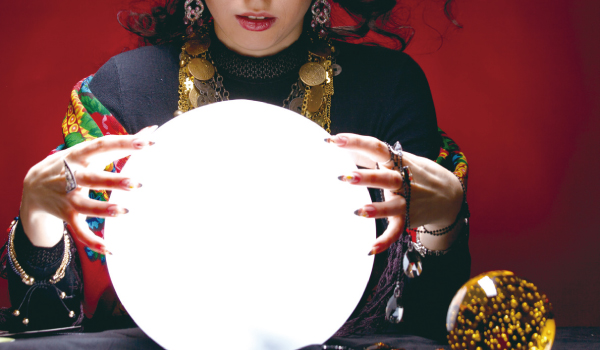
Though we all wonder what the future will bring, some of us just can't wait to find out. For these people, the solution is to consult a fortune teller. Fortune telling, or "divination" as it is sometimes called, is a booming business around the globe. It can also be interlocked with many religions and cultures, and for this reason, it is a prodigious part of everyday life in various societies. In Europe, however, the opposite is true. Both the church and state declared fortune-telling to be a sin several centuries ago, and laws still prohibit its practice in some places today. It is, therefore, not held in high regard publicly. Mainstream religions in the United States also uphold this view, though one may be surprised at how many people there, from the very rich to the very poor, do consult fortune-tellers of all kinds. After all, aren't horoscopes also a form of fortune-telling? Techniques for telling fortunes stem from the roots of a civilization. Those who claim an ability to see future events do so with the passed-on knowledge of many before them, using whatever means available at the time. Some techniques that have been practiced in Europe and in North and South America are: tarot reading (by cards), tasseography (by tea leaves), chiromancy (palmistry), and crystallomancy (by a crystal sphere). In Asia, many kinds of divination originated from the Chinese concept of suan ming. One of the most popular of these fortune-telling systems is the "Eight Characters." The method was devised by taking a person's birth year, month, day, and hour and displaying them as four columns, or "pillars," consisting of two characters each. The four pillars have eight characters altogether, thus the name Eight Characters. The "casting," or throwing, of bones, stones, shells, leather strips, or pieces of wood is the most traditional method of telling fortunes in Africa. The techniques fall into one of several categories: casting marked objects and numerically counting up how they fall according to their markings or whether they touch each other, and casting a set of symbolic bones or articles to signify, for instance, travel, pregnancy, etc. As expected, fortune-telling by any method is controversial. It is not surprising that scientific investigations have concluded that divination is impossible and that fortune-tellers are really just experts in reading body language and making general statements that seem specific to the situation.
雖然每個人都會好奇自己的未來,有些人卻迫不及待、求助於命理師來一窺究竟。算命或稱「占卜」,可說是全球蓬勃發展的行業,而且常與許多宗教文化密不可分。正因如此,算命在各種社會風俗裡,占日常生活很大的比重。 不過,歐洲卻反其道而行。教會與政府於數世紀以前,宣稱算命是一種罪行,至今仍有部分地區以法律嚴禁算命。因此,算命不是一個大眾推崇的職業和行為。美國的主流宗教秉持著同樣看法。但是不論貧富、不分問題類型,喜歡算命的人何其多,這樣的現象還真是令人吃驚。畢竟,星座不也是一種算命形式嗎? 算命的方法衍生自文明的根源。宣稱能未卜先知的人,其實是承襲前人衣缽,並且就地取材,使用當時的可用資源。而歐洲、北美洲與南美洲所採用的部分算命法包括塔羅牌、茶渣占卜術、看手相以及水晶球占卜術。 亞洲的許多占卜術源自於中國的「算命」觀念。最廣受歡迎的一派,就是「生辰八字」。此命理學是運用一個人的出生年、月、日和時間,排出所謂的四柱命盤,而每一柱裡各有一對天干地支。因此四柱共有八種干支,形成「八字」此名稱。
而非洲最傳統的算命法,就是丟擲骨頭、石塊、貝殼、皮繩或木片等「卜卦」方式。這類算命法具有若干解卦類型,例如:丟擲不同標記的物體後,記住落下的順序,根據標記或物體是否互相碰撞來解卦;或是丟擲具有旅行、懷孕等象徵意義的一組骨頭或物品。 想當然爾,不管是哪一種算命方式,其實都極具爭議。難怪科學研究得出的結論是:占卜術不可能存在,命理師不過是深諳肢體語言、以看似符合當下情境、實則做出籠統陳述的專家罷了。 |